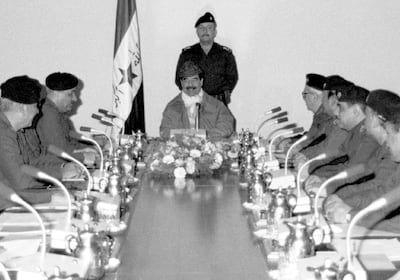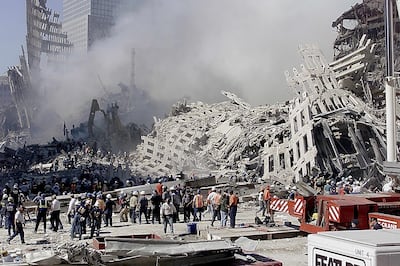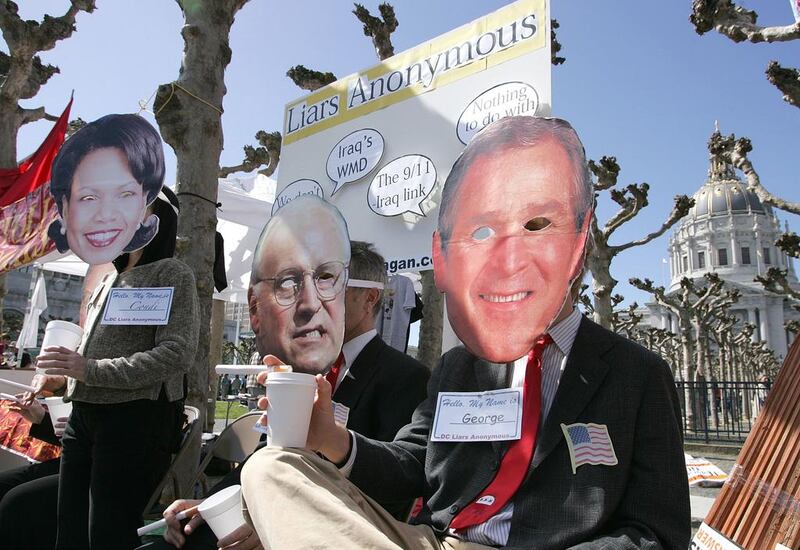Nearly 20 years on and we still don’t fully understand why the US invaded Iraq in 2003. Nor do we really know the link to 9/11, although there is unquestionably a connection.
To some extent, that’s because the decision to invade was ultimately then president George W Bush’s alone and he has never provided a satisfying answer. Mr Bush has almost given too many explanations to allow anyone to settle on just one. Likewise, those around him have speculated frequently on his motives and their speculations have tended to confuse more than they clarify.
Mr Bush also did things before the invasion that call all of it into question – such as reminding foreign dignitaries unprompted that Saddam Hussein had tried to kill his father, former president George HW Bush.
In addition, Mr Bush relied heavily on the advice of those around him, who themselves had different reasons for favouring both the invasion and the way in which the US conducted it.

One aspect, voiced most frequently by then vice president Dick Cheney, was what journalist Ron Suskind has called the “one per cent doctrine”. That in the post-9/11 era, the US could not sit back and wait for threats to materialise, nor could it afford to ignore a threat that held any potential to cause grave harm to the US or its interests. If there was even a one per cent chance of it occurring, it had to be treated as if it were a 100 per cent certainty.
Within this argument, Iraq did link directly to 9/11 because if there was even a one per cent chance that Saddam would give weapons of mass destruction to terrorists, he had to be eliminated. Seen through this lens, removing Saddam was not irrelevant to the attacks on the World Trade Centre and the Pentagon at all; he was the very lesson of the 9/11 attacks.
Another group of Mr Bush’s advisers saw the threat from Saddam in a wider perspective. This group, at least some of whom self-identified as “neoconservatives”, saw Iraq as threatening a range of American interests in the Middle East. Saddam was aggressive, violent, domineering and determined to make himself the leader of the Arab world – whether the other Arabs wanted it or not. He hated the US, he had used WMDs indiscriminately on both foreigners and his own people, he wanted to destroy Israel, he wanted to be able to dictate the global price of oil, and he had supported various terrorists in the past.
They ardently believed that Saddam was in league with Al Qaeda in part because they underestimated the ability of terrorists to operate without state support. But also because they saw the interests of the two as aligned and assumed that where there was common cause, there would be common effort. In that sense, they didn’t try to manufacture false information linking Iraq to Al Qaeda; they were absolutely convinced that the two were linked and so were willing to believe even the most foolish or outlandish reports that seemed to confirm their belief.
Yet, they also had a more idealistic rationale for wanting regime change. As fervently as they saw Saddam as the source of all America’s troubles in the Middle East (including Al Qaeda), they just as passionately believed that democracy could flourish in the Arab world and that Iraq would prove it. They rejected western slurs about “Arab exceptionalism” that insisted that Arabs were not capable of practising democracy.
They argued that overthrowing Saddam would allow the US to establish a democracy in Iraq (too quickly and too easily, in their minds) and that a democracy there would transform the entire region. Thus, for them, invading Iraq would not only remove the source of America’s greatest problems in the Middle East, it would create a new, pro-American democracy that would turn the region from a land of problems to a land of promise.
Then there were more traditional hardline American conservatives who favoured invasion for still different reasons. Most of them disdained the idealism of the neocons and simply saw Saddam as a threat to American interests and 9/11 as an opportunity to deal with it.
For them, force was the only way to deal with the problem of Saddam, a problem that would remain as long as he remained in power in Iraq. The 9/11 attacks had galvanised the American public to act against threats, and Saddam was clearly such a threat, even if he was not the prime mover in the events of September 11.
Last, there were also more moderate voices within the Bush administration who mostly supported the invasion, although they were appalled at the bungled occupation. In this, they echoed the views of many Democrats, including most of the leadership of the preceding Clinton administration, who also supported an invasion of Iraq, even if they did not support the way Mr Bush handled it. Then senators John Kerry, Hillary Clinton and Joe Biden all voted in favour of force. Moreover, Mr Bush won re-election in 2004, as many Americans still supported the invasion in large part because it was not yet clear that the occupation was an utter fiasco.
Moderate Democrats and Republicans felt this way in large part because everyone – except Saddam and a handful of his closest aides – truly did believe that he had retained secret WMD capabilities. Possibly some weapons, more likely the capacity to build new weapons.
It is critical to understand that everyone believed this because it was the glue that held support for the invasion together, within the Bush administration and without. All of the American intelligence agencies and all of their analysts believed it. I served twice at the National Security Council in the Clinton administration, including as the director for Gulf affairs, and I never heard an intelligence analyst from any agency voice anything but full-throated support for the notion that Iraq had retained some WMD capabilities. The Israelis believed the same. And the Iranians. And the Jordanians, Egyptians, British, French, Germans, Russians, and anyone else who had any intelligence on Iraq.
Let’s not forget that the vast majority of Iraqis believed it too, because Saddam wanted them to. When the US invaded, American soldiers started debriefing Iraqi army officers as they were captured, asking them about WMDs. Each one stated that his unit had no WMDs, but that another unit nearby did. When we captured the officers of that unit, they would say that they didn’t have it, another unit did. Only when the entire army had surrendered and we had debriefed officers from every division did we realise that none of them had WMDs – even though all of them believed that someone else did.

That is the final piece of the puzzle in understanding why the US invaded Iraq after 9/11. Because the American people as a whole saw invasion as the ultimate answer to the problem of Saddam, a problem that had bedevilled us since at least 1990. With only a handful of exceptions, every American believed that Saddam was violating the UN resolutions and holding on to some WMDs, despite the cost of sanctions to his own people. That symbolised the threat that Saddam held for the Middle East and for American allies and its interests there.
The one per cent doctrine, the neocon strategy and the traditional conservative approach should be seen as highly amplified versions of that same perspective. A perspective that existed well before 9/11. Remember that it was former president Bill Clinton who declared that America’s policy towards Iraq was one of regime change, and it had been George HW Bush who had authorised the covert campaign to overthrow his government.
There is no question that the 9/11 attacks enabled the invasion of Iraq. Absent them, it is hard to imagine that the US would have invaded. But the rationale for the invasion was already in place well before the first plane hit the north tower.
Kenneth M Pollack is a senior fellow of the American Enterprise Institute, a former CIA analyst and a former staff member of the US National Security Council. He has worked on US policy towards Iraq for more than 30 years





